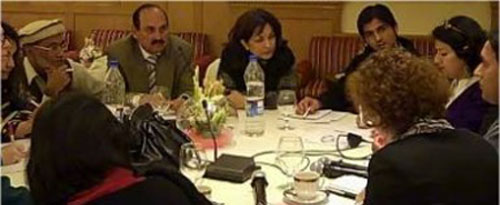Dialogue for change across South Asia
Date:

New Delhi/ Islamabad/ Colombo/ Dhaka/ Kathmandu - Two weeks. Five countries. One pivotal question: What should UN Women do differently in the coming years?
Activists, government counterparts and donors across Bangladesh, Pakistan, India, Sri Lanka and Nepal answered this question adding their unique perspectives. While in Bangladesh, they wanted UN Women to have a wider mandate to work on gender equality, in India they requested UN Women to focus on a specific niche.
A representative of the Government of India urged UN Women to make violence against women a huge priority in the Indian sub-continent. “We need to look at the entire gamut of issues – is the legislation adequate? Are there minimum standards of care and adequate supports services? Can we change mindsets especially that of boys and men? In all of this, UN Women has a lead role to play in partnership with the Ministry,” said Vinita Agarwal, Director, Ministry of Women and Child Development, Government of India.
As one of the biggest donors to UN Women, the Royal Government of Norway gave a clear message to UN Women in the region. “UN women cannot be doing everything for everybody. It needs to carve out a niche and be good at that niche. Focus is essential and UN Women could concentrate on women’s empowerment (political) and Women, Peace and Security (including VAW),” cautioned Mr. Aslak, Counsellor, Royal Norwegian Embassy, India.
UN Women was formed on 1 January 2011 as a result of demands by member states and women’s rights activities for a distinct entity working for women’s rights. With six months left to prove to donor and partners that it is different and distinct from the merged entities, UN Women is working on a strategy that reflects both the needs and aspirations of women in South Asia. In that spirit, almost 13 consultations were organized by UN Women in South Asia to draw inputs from partners on its unique niche in the region.
Seen as a big opportunity to start afresh, partners in Nepal stressed the need for UN Women to support national government to implement treaties, obligations and conventions. Besides a national consultation in Kathmandu, UN Women in Nepal also organized meetings in four other districts - Dhanusha, Kapilvastu, Mahottari and Morang.
Regardless of differences in views or opinions, participants across all countries unanimously echoed the need for change and for UN Women to be at the centre of it. In Peshawar, Lahore, Islamabad and Karachi, ‘change’ was the buzzword. Everyone from government ministries, non-government, academia, media, religious scholars, lawyers and UN Agencies were quick to support it. They saw UN Women as an agent of change for progressive and independent women, leading the way for gender equality.
In Sri Lanka, the absence of a UN Women office in Sri Lanka did not deter women activists and they voiced their concerns with passion and clarity. They asserted that UN Women should play a greater role to ensure that the Government of Sri Lanka is aware of its international obligations and held accountable by using international conventions such as CEDAW.
“UN Women should function as a mediator between the government and civil society groups,” they urged.